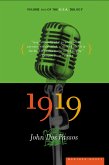A historical portrait of one woman's quest for happiness amid a lifetime of bad men. There Are Victories is a proto-feminist, anti-Bildungsroman that explores the intersections of misogyny, class, religion, and prejudice within upper class Anglo-Montreal and New York City society before, during, and after WWI. Originally published in 1933, There Are Victories takes up the catastrophe of the home front and the ways in which the life--and happiness--of the novel's protagonist, Ruth Courtney, is continually undermined by the bad behaviour of men. This new edition features a foreword by Scotiabank Giller Prize winner Johanna Skibsrud.
Hinweis: Dieser Artikel kann nur an eine deutsche Lieferadresse ausgeliefert werden.
Hinweis: Dieser Artikel kann nur an eine deutsche Lieferadresse ausgeliefert werden.








